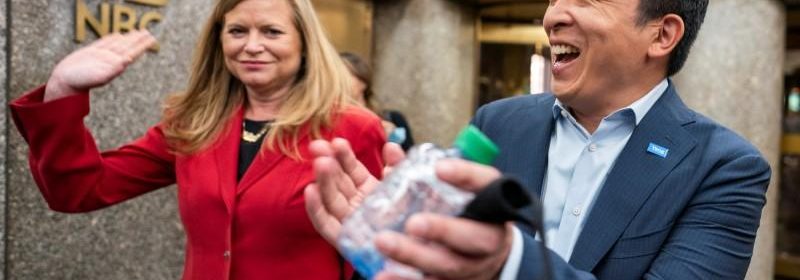In final debate, Democratic NYC mayoral candidates clash over policing

(Reuters) – The eight leading candidates seeking the Democratic nomination for New York City mayor exchanged jabs on Wednesday over public safety, housing and homelessness at the final televised debate before Tuesday’s primary election.
But with the race lacking a definitive favorite six days before Election Day, the two-hour debate seemed unlikely to fundamentally alter the contours of what has been a fluid and unpredictable campaign as the pandemic-stricken city grapples with rising crime and economic inequality.
Eric Adams, the Brooklyn borough president and former police captain, faced only a handful of attacks despite entering the evening as the front-runner in most recent polls.
At one point, Adams and Andrew Yang, the former presidential candidate and entrepreneur who appeared to be the contender to beat for much of the race, traded barbs over whether Adams had sought the backing of the police captains union, which endorsed Yang this week.
Scott Stringer, the city comptroller, attacked Yang for his proposal to give direct cash relief to the poorest New Yorkers, arguing that the amount of money involved would not make enough of a difference. Adams piled on, calling Yang’s plan “Monopoly money.”
Much of the debate’s early clashes focused on public safety, which has been the No. 1 issue during the campaign thanks to a spike in violent crime around the city.
Adams, Yang and former sanitation chief Kathryn Garcia, considered more moderate candidates, have proposed beefing up the police department in response. The liberal candidates – Maya Wiley, a civil rights lawyer and former MSNBC analyst; Dianne Morales, a former nonprofit executive; and Stringer – were the only ones not to raise their hands when asked whether they would increase police officers on the subway.
Wiley, whose endorsement by U.S. Representative Alexandria Ocasio-Cortez cemented her status as the favorite among liberal activists, faulted Adams for suggesting he would reinstitute the use of stop-and-frisk, a strategy that in the past has disproportionately affected Black men.
Adams, however, vowed not to implement any practice that was racially discriminatory.
Garcia, who has campaigned as an experience government hand, sought to stay above the fray, though she criticized several of her liberal opponents – without naming them – for supporting major cuts to the police budget.
Adams, Wiley, Garcia and Yang are widely seen as the top four candidates, based on public polling. The city is using a new system, ranked-choice voting, in which voters can rank up to five candidates in order of preference – another reason that the race remains hard to forecast, even as early voting has already begun.
Source: Read Full Article
